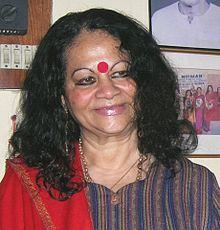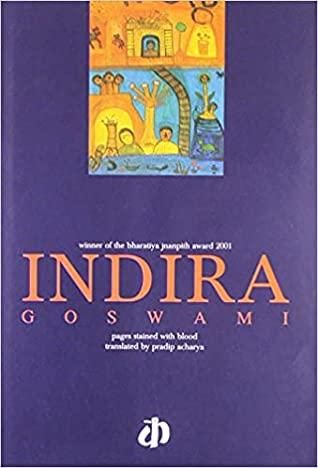Mamoni: From Depression to Expression
Her loose curly hair, kohl eyes, and big bindi were the distinctive style of Mamoni Raisom Goswami whose works left a lasting impression on the people of Assam. She became a voice for the oppressed and questioned the different practices and rituals of the society which created a stir. Undoubtedly, she was a very distinctive woman who never shied away to voice her opinions. She found solitude through her writings

Pen name: Mamoni Raisom Goswami (Image source: Wikipedia)
Born in 1942, to a Vaishnavite Brahmin family in Guwahati, Mamoni Raison Goswami’s life was closely associated with Satra life of the Ekasarana Dharma. She had a turbulent upbringing since an astrologer had predicted before her birth that she would be a troublemaker who would bring shame to the family and should be put to death. Her mother didn’t comply with it.
Mamoni’s career as a writer began when she published her debut anthology of short stories ‘Chinaki Morom’ in 1962 when she was only 13 years old. This was the first time she voiced her feelings in the form of fictional tales.
Goswami experienced depression since she was a little child. In her autobiography, ‘Adha Likha Dastabej,” she discusses her desire to plunge from the cliff of Shillong’s Crinoline Falls when she was young. Her early years were marked by numerous suicide attempts. She first got married in 1965 but the marriage didn’t last long.
Her second marriage in 1966 also ended up tragically when her husband Madhaven Raisom Ayengar passed away in a car accident just after 18 months of marriage. She became heavily dependent on high doses of sleeping pills. Writing has since become a haven for her solitary life.
Her life experiences inspired her work and she wrote the novels ‘Ahiron’ and ‘The Chehnab’s Current’ based on her experiences in Kashmir and Madhya Pradesh. But after her husband's death, as her mental health deteriorated, her advisor Upendra Chandra Lekharu convinced her to move to Vrindavan so that she could have a different environment and at the same time conduct some research.
Goswami relocated to Delhi in 1971 and became a Professor of Assamese in the Modern Indian Languages and Literary Studies (MIL) Department of the University of Delhi. This served as the setting for a number of her short stories, including ‘Hridoy’, ‘Nangoth Sohor’, and ‘Borofor Rani.’
But her life in Vrindavan had a profound impact on her as she observed the social ostracism and the violent, authoritarian and exploitative face of religion in the suffering of Hindu widows which she notes down in her novel ‘Nilakanthi Braja’ (1976). Later, she used to claim that the suffering of the main character, Saudamini, is a reflection of her own experience after the death of her husband.
In her book ‘Pages Stained With Blood’, Goswami talks about the plight of Sikhs during the 1984 riots that followed after the assassination of Indian Prime Minister Indira Gandhi. Goswami was residing in Shakti Nagar, Delhi during this period and had seen the riots with her own eyes.
Her book ‘The Man from Chinnamasta,’(2005) which she wrote at the height of her literary career criticizes the 2,000-year-old practice of animal sacrifice in the Kamakhya Temple in Assam. Even though Goswami used scriptural quotations in the book to support her case and that it is preferable to worship the goddess with flowers rather than blood, she received a lot of death threats for writing on such a controversial issue.
Mamoni Raisom Goswami published 12 novels, 9 short stories, and a book of poems titled "Pain and Flesh" throughout her lifetime. She has been a recipient of several accolades and recognition. She received the Sahitya Akademi Award in 1983, Principal Prince Claus Laureate in 2008. She is the second person from Assam to win the highest literary award in India, the ‘Jnanpith Award.’ In recognition of her great contributions to the fields of art, literature, culture, and social service, Goswami received the state's highest civilian honour, the Asom Ratna in 2010.
She is also recognized for her efforts to organize social change, both through her writings and in her acting as a peacemaker between the state government and the armed terrorist group United Liberation Front of Assam. Her efforts resulted in the creation of the People's Consultative Group, a committee for achieving peace.
Her book ‘The Moth Eaten Howdah of the Tusker’ has been adapted into the film ‘Adajya’ by Shanatana Bordoloi in 1996. Jahnu Barua, a reputed Indian film director, directed a film based on her life called ‘Words from the Mist.’
She died on 29 November 2011 in her birthplace Guwahati.

Cover of ‘Pages Stained with Blood’ by Indira Goswami (image source: Wikipedia)


